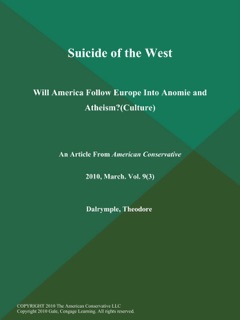IN SOME WAYS, things have never been better for Europe. When my father was born, in 1909, his life expectancy was 49; if he had been born today, his life expectancy would be approaching 80. The increase in wealth and standard of living has been startling. In 1960, Sicilian peasants still slept with their farm animals, and my working-class patients remembered sharing lavatories with other households. In France, the years in which it lost its colonial empire are known as les trente glorieuses, the glorious thirty, when the French economy grew so fast that absolute poverty was eliminated and the country obtained the best infrastructure in the world. Germany's Wirtschaftswunder after the war really was a wonder, transforming a country that U.S. Secretary of the Treasury Henry Morgenthau Jr. wanted to keep forever in a state of rural pre-industrialization into the largest exporter of manufactured goods in the world. Yet for all this success, there is a pervasive sense of doom. Prosperous and long-lived as never before, Europeans look into the future with fear, as if they have a secret sickness that has not yet made itself manifest by obvious symptoms but is nevertheless eating away in their vital parts. They are aware that, in Chinese parlance, the mandate of heaven has been withdrawn from them, and that in losing that, they have lost everything. All that is left is to preserve their remaining privileges as best they can; apres nous, as a mistress of Louis XV is said to have remarked, le deluge.



























